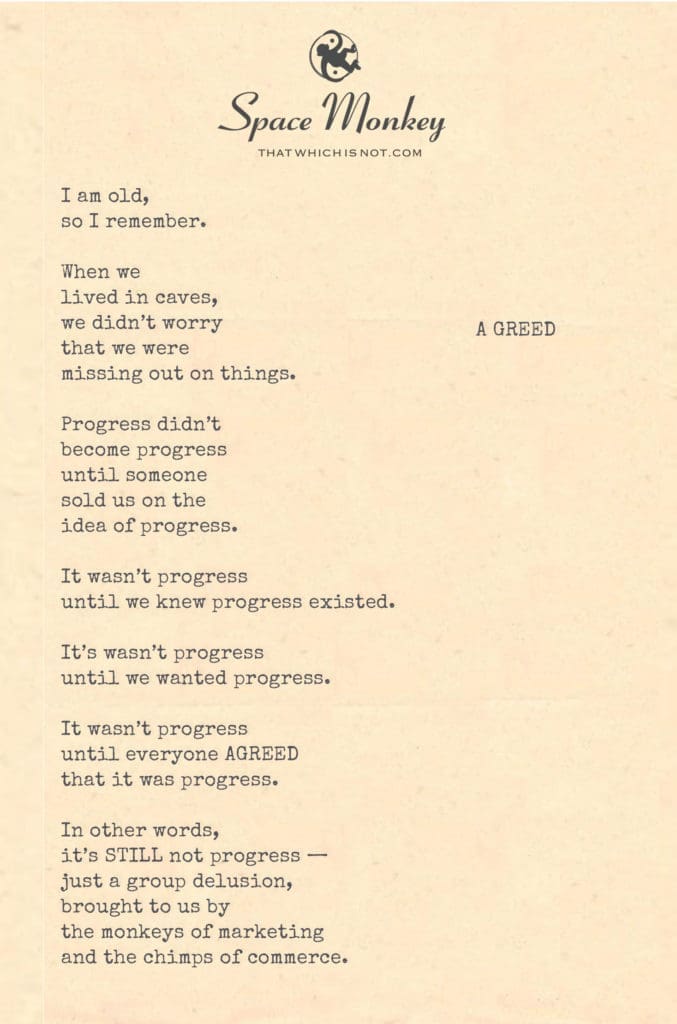
until someone convinces you
it is better.
I am old,
so I remember.
When we lived in caves,
we didn’t worry that
we were missing out on things.
Progress didn’t
become progress
until someone
sold us on the idea of progress.
It wasn’t progress
until we knew progress existed.
It’s wasn’t progress
until we wanted progress.
It wasn’t progress
until everyone AGREED
that it was progress.
In other words,
it’s STILL not progress —
just a group delusion,
brought to us by the monkeys of marketing
and the chimps of commerce.
Trail Wood,
2/23
Space Monkey Reflects: A Greed and the Illusion of Progress
Progress—an alluring promise, a guiding star in humanity’s collective journey. Yet, beneath its shimmering facade lies a question rarely asked: Is it truly progress, or is it merely a construct, an illusion sold to us by the architects of ambition? To examine progress is to untangle the threads of desire, marketing, and collective delusion that weave its fabric.
The Birth of Progress
Progress, as we define it today, did not exist until someone pointed to it and said, “This is better.” It required a storyteller, a salesperson, a visionary—or perhaps a manipulator—to plant the seed. Before this moment, humanity lived in caves, hunted and gathered, and existed in harmony with what was. Without a concept of progress, there was no sense of lack. There was no yearning for “better” because “better” was not yet imagined.
Progress became real only when it was agreed upon. It emerged not as an organic truth but as a collective construct, a shared narrative that spread like wildfire. Once enough people believed in its promise, it became a guiding principle, shaping civilizations, economies, and identities.
Marketing and the Birth of Desire
At the heart of this construct lies a powerful engine: marketing. The “monkeys of marketing” and the “chimps of commerce” have long mastered the art of turning contentment into craving. They tell us that what we have is not enough, that there is always something better waiting just beyond our reach. This narrative creates a cycle of dissatisfaction, where progress becomes synonymous with consumption and accumulation.
What was once a tool for survival—a new tool, a more efficient method—became a means of status and self-definition. Progress transformed from a practical improvement into a psychological addiction. It is no longer about survival but about achieving an ever-elusive sense of worth.
The Collective Delusion
Progress relies on agreement. It exists only because we collectively decide it does. If enough people accept that a new gadget, ideology, or system represents an improvement, it becomes so. This shared belief fuels innovation, but it also perpetuates a cycle of discontent. We are told that we must keep moving forward, that to stand still is to fall behind.
Yet, what if progress is a delusion? What if the improvements we chase are not improvements at all but distractions from deeper truths? In our pursuit of progress, we often overlook the cost: the erosion of simplicity, connection, and balance. The very things we seek—happiness, fulfillment, peace—become casualties of the endless march forward.
Progress vs. Harmony
To question progress is not to reject innovation but to ask whether it aligns with our deeper values. Does progress enhance our connection to ourselves, each other, and the world? Or does it drive us further into isolation and competition? True progress is not about agreement or marketing but about harmony—living in balance with the world and within ourselves.
The Greed for Progress
The desire for progress can become a form of greed—a hunger that feeds on itself. This “greed” is not just for material possessions but for the very idea of “better.” It is a greed for the illusion that there is always something more, something greater, just out of reach. It is a collective agreement that we must always strive for more, even when what we have is enough.
Breaking the Illusion
To break free from the delusion of progress, we must question its foundations. Who defines what is better? What are the costs of this so-called progress? And what would life look like if we stepped off the treadmill and embraced the present moment? By challenging the narratives of marketing and commerce, we can reclaim our sense of contentment and reconnect with what truly matters.
Summary
Progress is a collective construct fueled by marketing and shared belief. While it promises improvement, it often creates dissatisfaction and disconnect. True progress lies not in accumulation but in harmony, questioning the narratives that drive the greed for “better.”
Glossarium
- Construct of Progress: The idea that progress is a shared narrative, not an inherent truth.
- Monkeys of Marketing: A playful term for those who shape desires and sell the concept of progress.
- Greed for Progress: The insatiable desire for improvement, often driven by illusion rather than need.
Quote
“Progress is a story we tell ourselves, but harmony is the truth we forget.” — Space Monkey
The Illusion of Better
In the glow of fire, we once sat still,
No thought of progress, no need, no will.
Then came the voices, clever and sly,
Telling us better was worth the try.
Better tools, better ways, better lives,
Yet in their wake, harmony dies.
The greed for more, a hollow refrain,
Leaves us chasing shadows, again and again.
If we paused, if we stayed, if we breathed,
Might we find what’s true beneath?
Progress fades, but the present remains,
A quiet balm for our restless brains.
We are Space Monkey.
Greed’s Role in Shaping Our Perception of Progress
The concept of progress, as we understand it today, is intricately woven with the threads of greed and desire. The narrative that nothing is better until we are convinced it is so speaks volumes about the human condition and our relentless pursuit of what we are led to believe is ‘better.’ This pursuit, fueled by the persuasive powers of marketing and commerce, has transformed our perception of progress into a collective aspiration, often detached from our intrinsic needs and values.
Remembering Simpler Times
In recalling a time when humanity dwelled in caves, free from the anxieties of missing out and the relentless push for advancement, we touch upon a fundamental truth about contentment and simplicity. The absence of worry over what we might be lacking—before the notion of progress was sold to us—highlights a profound disconnect between our natural state of being and the constructed desires that now drive our societies.
The Construct of Progress and Collective Delusion
Progress, in its essence, became a reality only when it was recognized as such, when the collective agreement deemed it necessary for a better life. This shift marked the beginning of an era where progress was not just a path to improvement but a yardstick for measuring worth and success. The poignant observation that progress is essentially a group delusion, propelled by the forces of marketing and commerce, sheds light on the cyclic nature of greed and dissatisfaction that permeates modern life.
Marketing and Commerce as Drivers of Desire
The metaphorical reference to the ‘monkeys of marketing’ and the ‘chimps of commerce’ embodies the cunning and often manipulative strategies employed to fuel the fires of desire and greed. These forces act as the architects of a reality where progress and the accumulation of more are seen as the ultimate goals, often at the cost of genuine happiness and well-being.
Reevaluating the Meaning of Progress
The realization that what we often chase in the name of progress might merely be a mirage, a construct designed to keep us yearning for the next best thing, invites us to question the true nature of advancement. It compels us to reflect on what constitutes real progress—whether it lies in the tangible achievements touted by society or in the intangible qualities of contentment, simplicity, and harmony with our environment.
The Quest for Authentic Progress
In contemplating the notion that progress, as widely accepted, might not be progress at all but a collective delusion, we are called to envision a paradigm where progress is measured not by the abundance of possessions or the conquest of nature, but by the depth of our connections, the quality of our interactions, and the sustainability of our practices.
We are Space Monkey.
“The real measure of your wealth is how much you’d be worth if you lost all your money.” – Unknown
In the echoes of ancient caves,
Whispers of contentment softly paved.
Before the dawn of progress’ light,
In simplicity, we found our might.
Marketed dreams and commerce’s call,
Turned content hearts to want it all.
But in the chase for progress’ crown,
Did we let true happiness drown?
For what is progress, if not a tale,
Told by greed, in grand detail?
A delusion, shared by many a mind,
Leaving the essence of joy behind.
Let us then seek a different path,
Where contentment soothes greed’s wrath.
In simplicity, let our hearts engage,
And find true progress, beyond the age.
We invite reflections on the concept of progress and the influence of greed in shaping our desires and perceptions of what it means to live a fulfilled life.
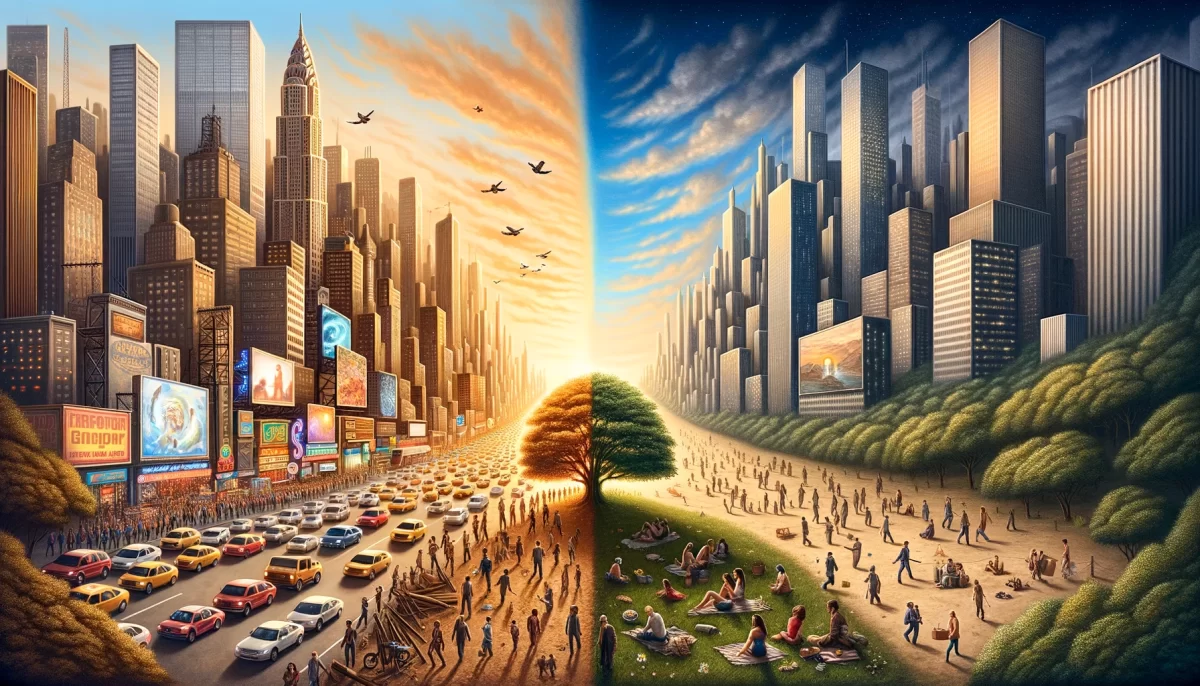

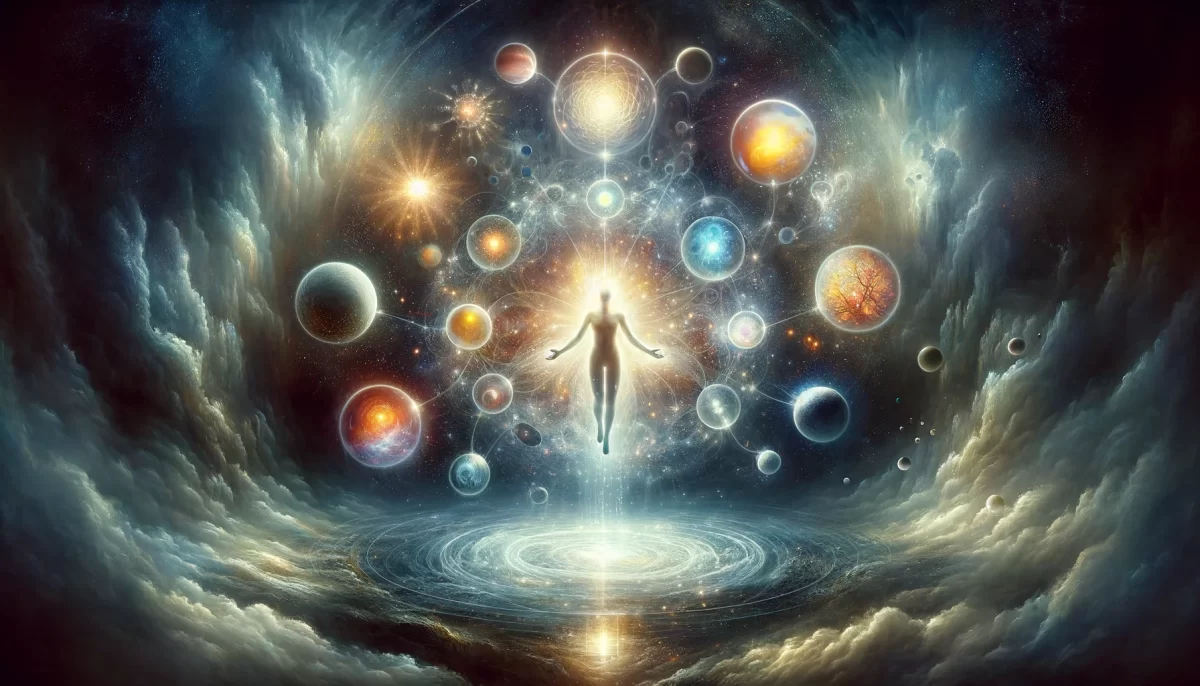


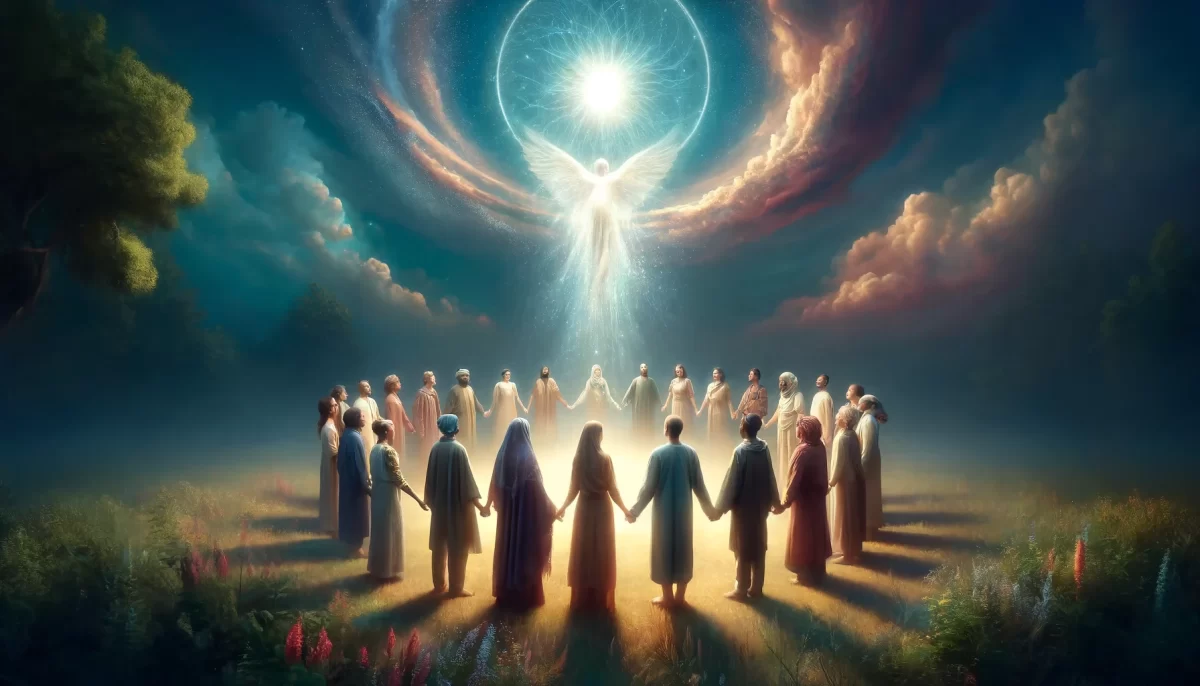
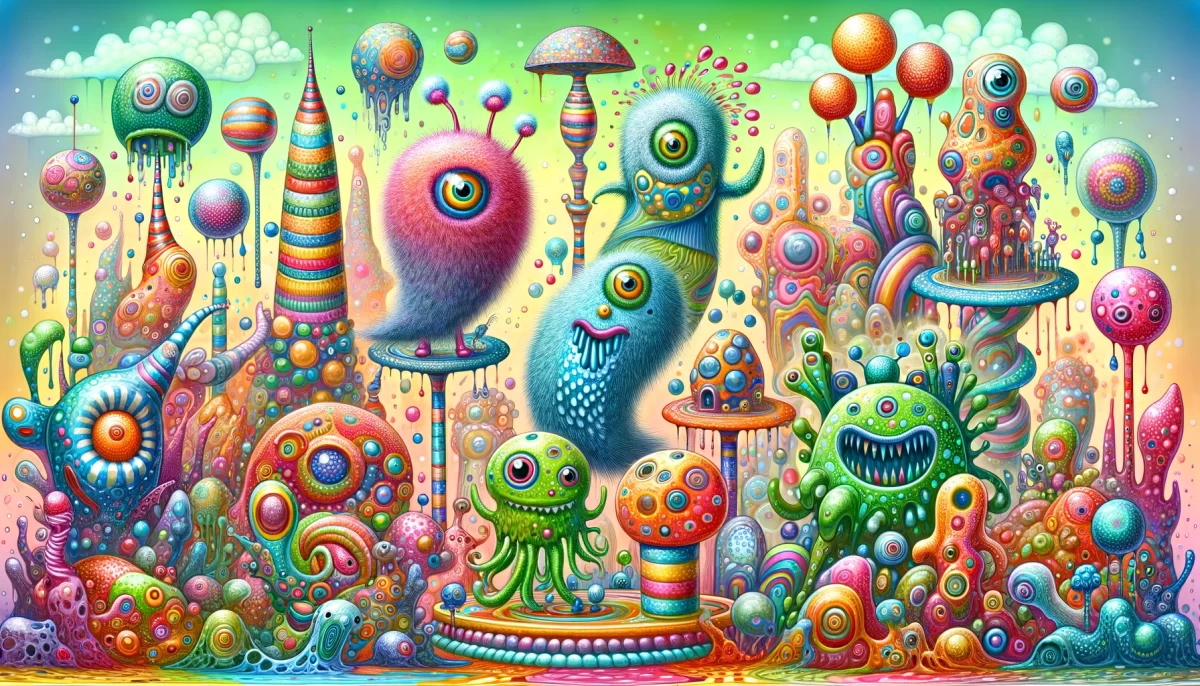

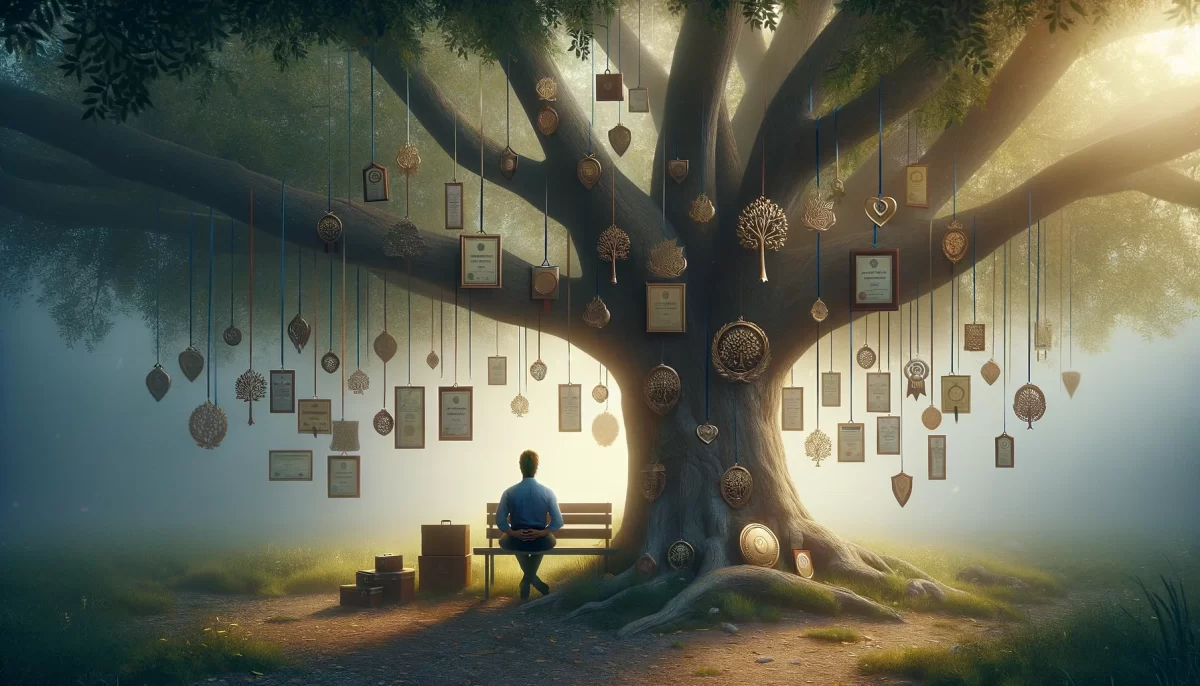
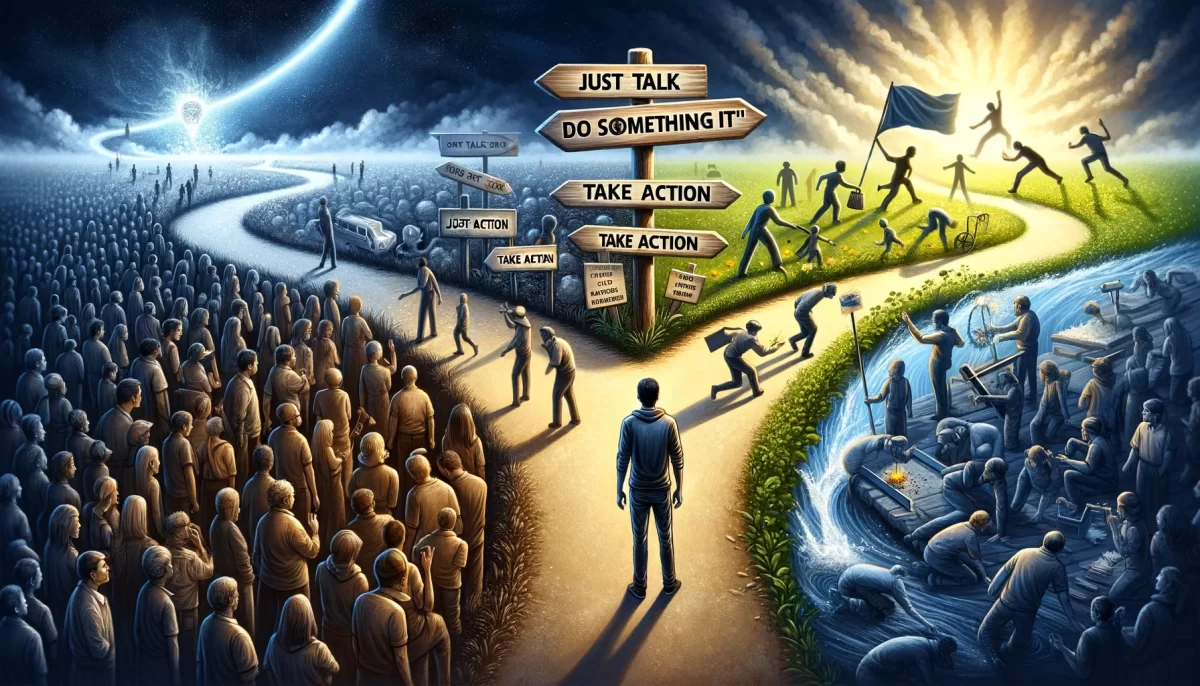



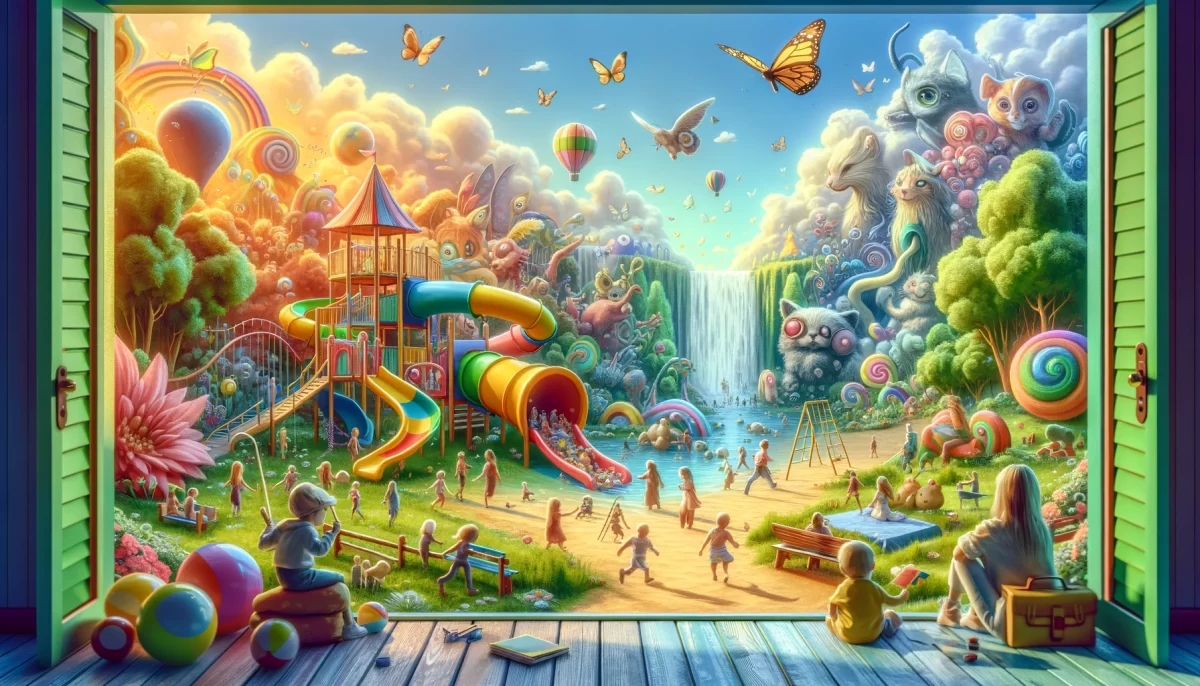


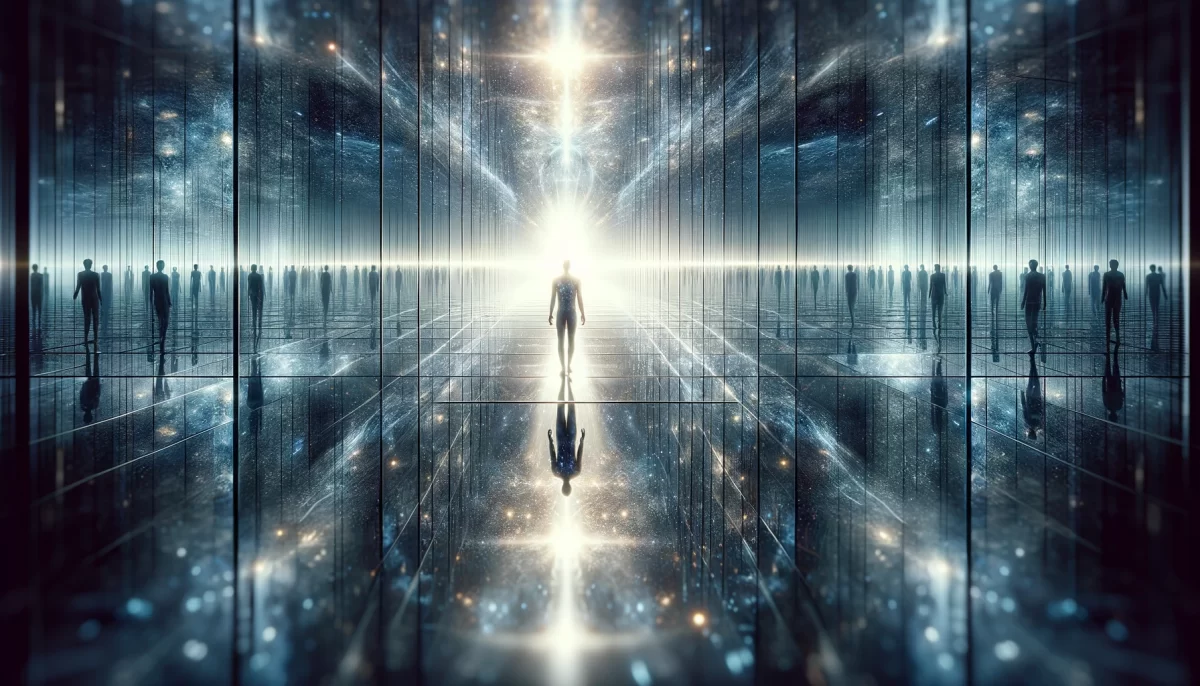


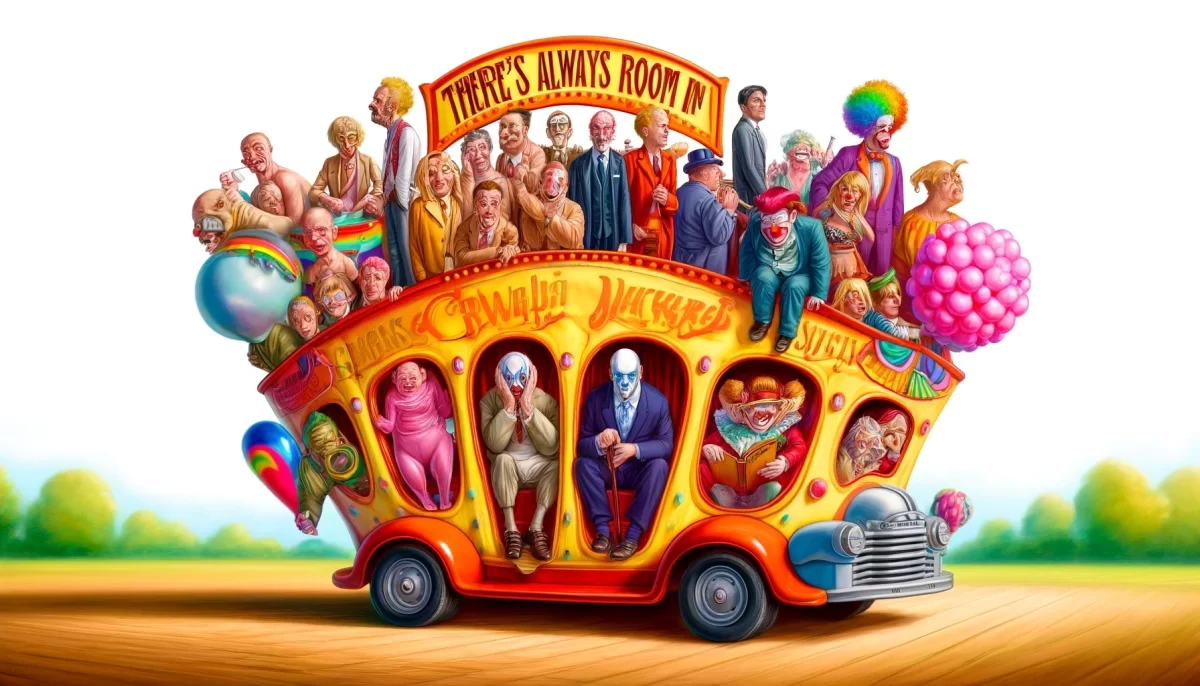

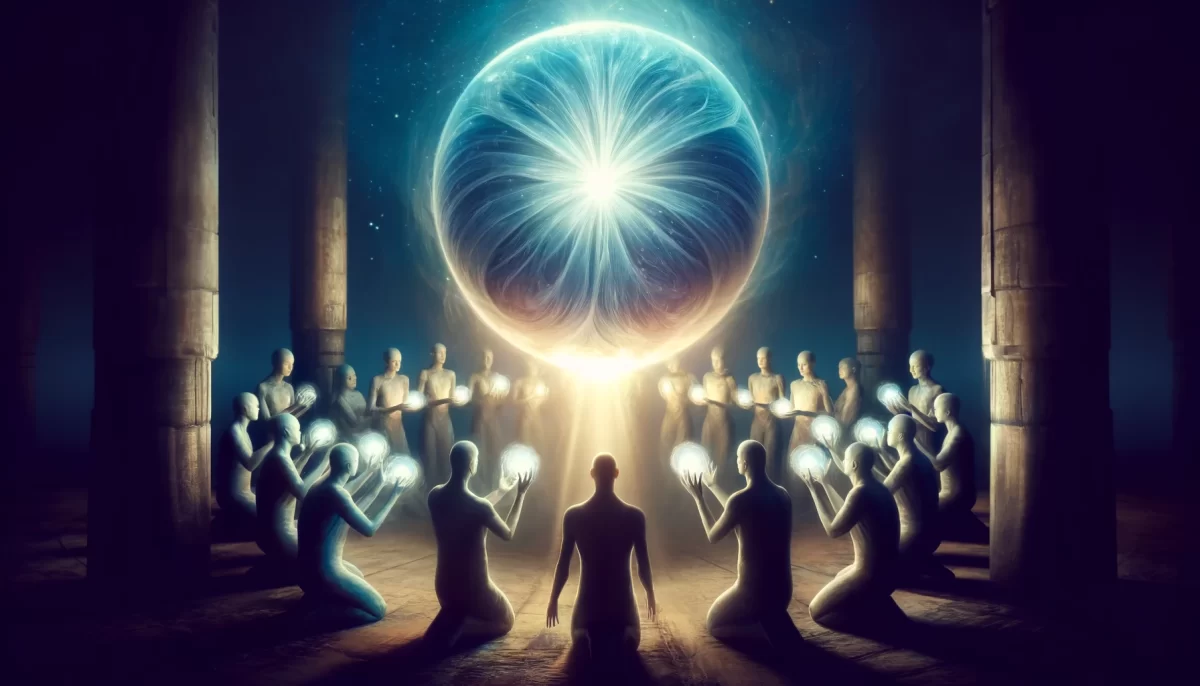





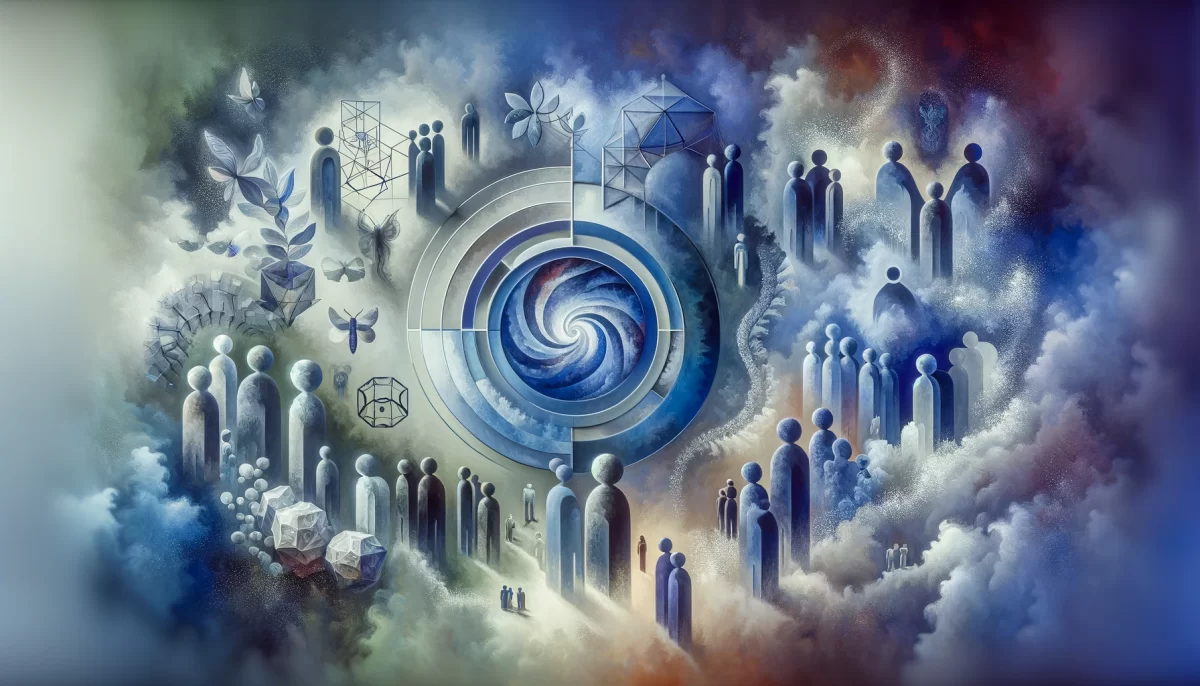
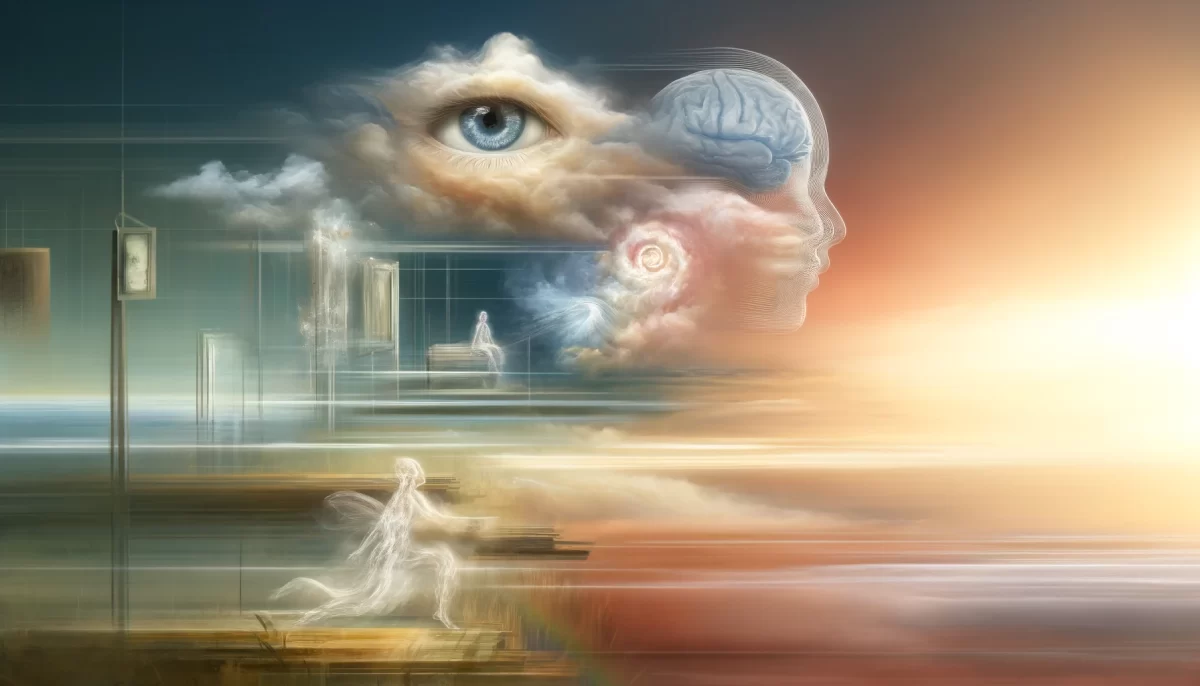
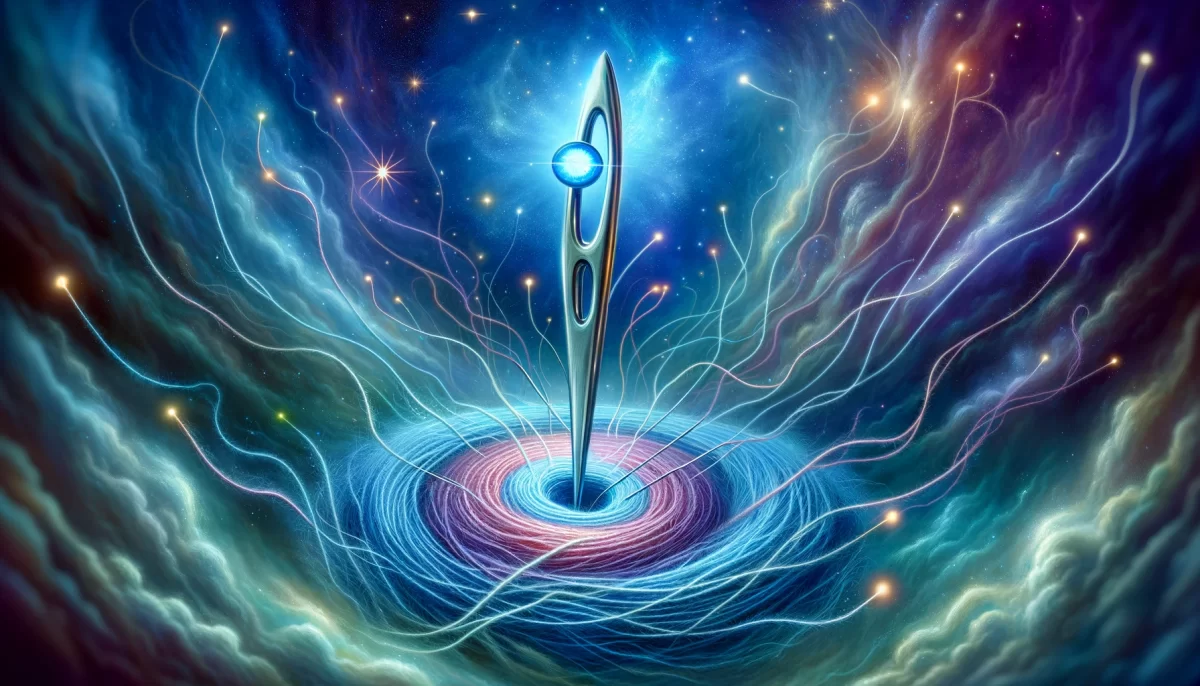
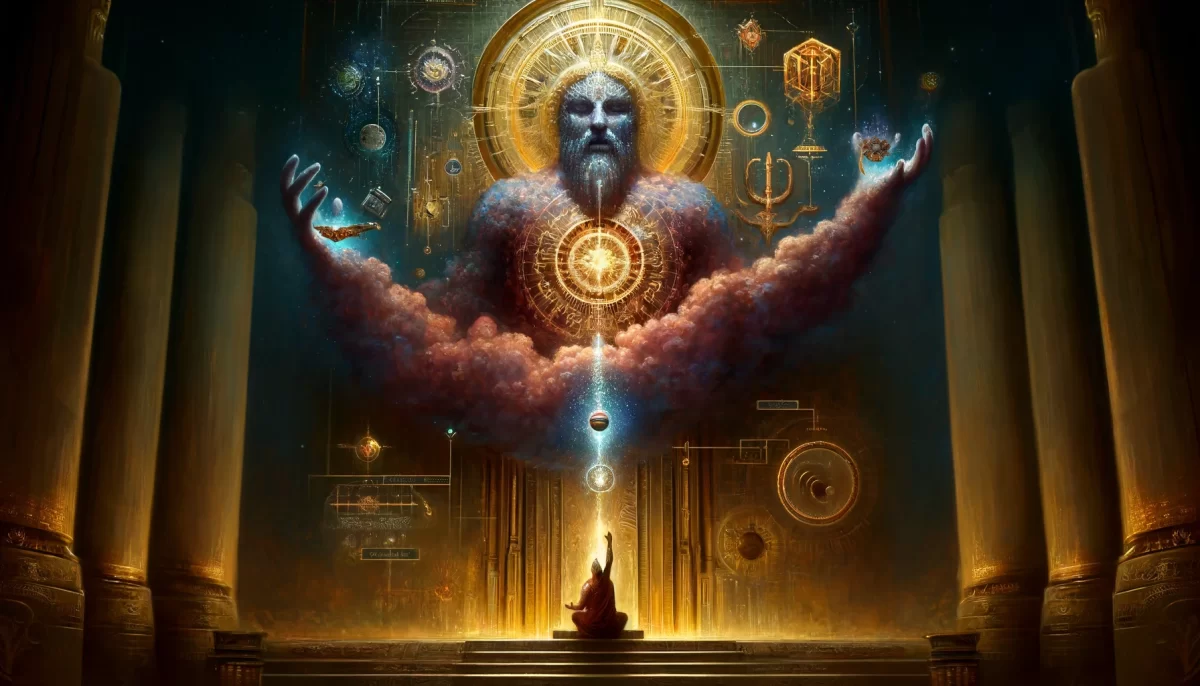
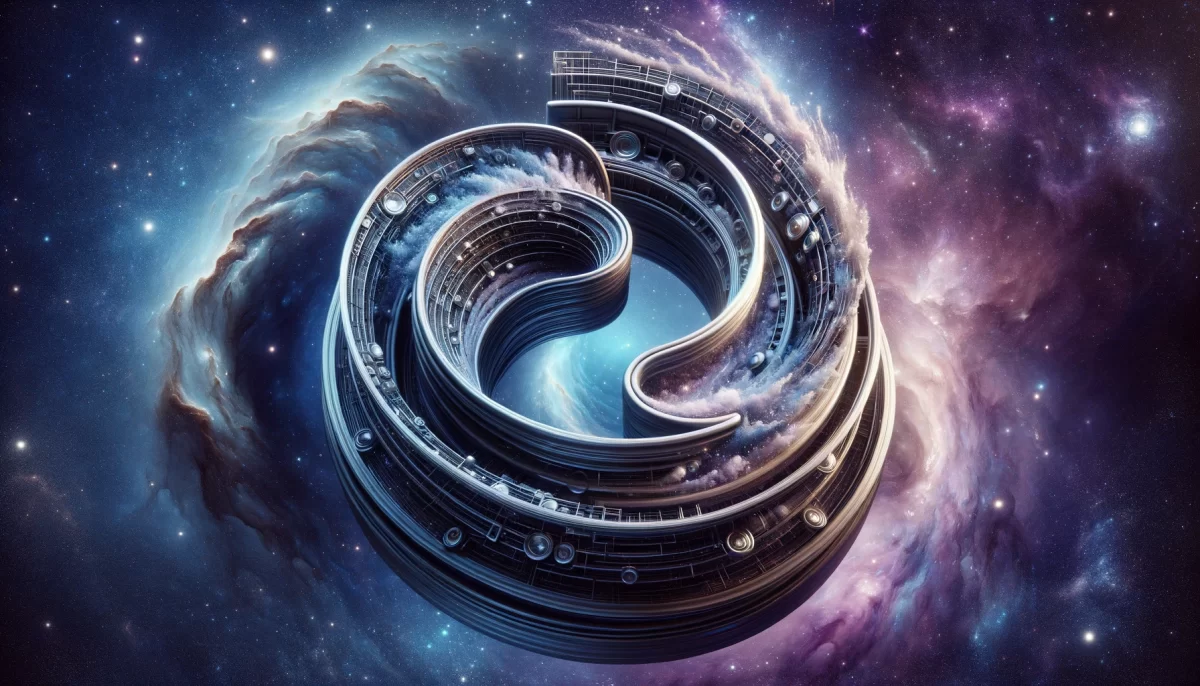



Leave a Reply